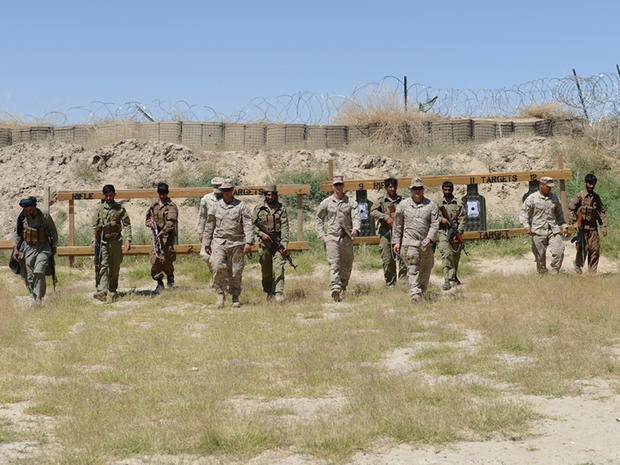Afghanistan policeman kills 3 American troops in Helmand province
Last update 4:50 p.m. ET
(CBS/AP) KABUL, Afghanistan - An Afghan police officer shot and killed three U.S. Marines after sharing a meal with them before dawn Friday and then fled into the desolate darkness of southern Afghanistan, the third attack on coalition forces by their Afghan counterparts in a week.
Thirty-one coalition service members have now died this year at the hands of Afghan forces or insurgents disguised in Afghan uniforms, according to NATO -- a dramatic rise from previous years.
U.S. officials told CBS News correspondent David Martin that the three slain troops were members of a Marine special operations force. Afghan sources in Helmand told CBS News Kabul bureau chief Fazul Rahim that they were part of a team overseeing the training and recruitment of Afghan local police. The sources said it was one of the police officers who opened fire on his mentors during dinner.
Friday's deadly shooting took place in the volatile Sangin district of Helmand province, said U.S. military spokeswoman Maj. Lori Hodge. Sangin was a Taliban stronghold for years and has one of the highest concentrations of improvised explosive devices, or IEDs, in the country.
Sangin's district chief and the Taliban both identified the gunman as Asadullah, a member of the Afghan National Police who was helping the Marines train the Afghan Local Police.
Taliban spokesman Qari Yousef Ahmadi said by telephone that the attacker joined the insurgency after the shooting.
"Now, he is with us," Ahmadi said.
The district chief, Mohammad Sharif, said the shooting happened at a police checkpoint after a joint meal and a security meeting. The meal took place before dawn because of Ramadan, the month in which Muslims abstain from food during daylight hours.
The shooting brings the number of fatal "green-on-blue" incidents - in which Afghan security forces turn on their Western allies - to 25 over the last 12 months, including those which didn't result in coalition fatalities.The attack brings to eight the number of Americans killed in Afghanistan this week, including one civilian working for the State Department.
U.N.: Dip in Afghan civilian casualties "hollow"
3 U.S. troops killed in Afghan suicide attack
Gunmen in Afghan uniform kills NATO troop
Thursday's incident is the second green-on-blue attack this week. On Tuesday, two gunmen confirmed to have been Afghan National Army soldiers turned their weapons on NATO troops, killing a U.S. service member and wounding two others, ISAF confirmed Friday morning.
The Taliban claimed responsibility for that shooting, which took place in Paktia province, eastern Afghanistan. The suspects escaped after the attack and a search was underway to track them down.
In a separate attack Wednesday morning, at least one suicide bomber walked up to a group of U.S. troops on foot patrol near the provincial council office in Kunar province, also in the east, and blew himself up, killing three American troops and one civilian working for the State Department's USAID program. There has been no indication that the bomber or bombers in this attack were wearing Afghan uniforms.
The Taliban traditionally steps up attacks in August, but the militant group's claimed success in recruiting rogue forces from the ranks of the Afghan army and police to turn on their Western allies, with whom they work and live very closely as ISAF ramps up its planned transition of security to Afghan forces, has fostered a lack of trust.
While the Taliban often claim they have infiltrated the Afghan security forces and are carrying out these attacks, CBS News reporter John Bentley reported in July that a U.S. Defense Department report maintains the attacks are not carried out by insurgents.
"Investigations have determined that a large majority of green-on-blue attacks are not attributable to insurgent infiltration of the ANSF (Afghan National Security Forces), but are due to isolated personal grievances against coalition personnel," the report said.
ISAF spokesman Brig. Gen. Gunter Katz told CBS News the latest attack is, "tragic, but doesn't reflect the security situation." He calls the shooting an "isolated incident".
"We're confident this won't stop operations," he said. "We trust our Afghan partners. But we're looking at how to mitigate incidents."
White House press secretary Jay Carney said he didn't want to "diminish at all the seriousness of the attack" but "it is important within the context here to recognize that missions ... are being conducted ever day, every hour involving U.S. forces and the 330,000 Afghan forces."
He added that the U.S. military "believes that the operational impact [of the attacks] has been negligible."
The Afghan security forces have established an eight-point vetting process. Katz explained that recruits require two letters from local elders as a character reference as well as biometric, medical and drugs checks, but ISAF is still working with the Afghan forces to improve this process.
Nonetheless, early in 2012, top U.S. commander Gen. John Allen ordered American units to select a "guardian angel" to watch over fellow troops, even as they sleep, at joint U.S.-Afghan bases and on joint operations involving live fire - a direct response to the mounting green-on-blue attacks.
Last year, a U.S. Army team led by a behavioral scientist produced a 70-page survey that revealed both Afghan and American soldiers hold disturbingly negative perceptions of the other.
According to the survey, many Afghan security personnel found U.S. troops "extremely arrogant, bullying and unwilling to listen to their advice" and sometimes lacking concern about Afghans' safety in combat. They accused the Americans of ignoring female privacy and using denigrating names for Afghans.
American troops, in turn, often accused Afghan troops and police of "pervasive illicit drug use, massive thievery, personal instability, dishonesty, no integrity," the survey said.
U.S. military officials have downplayed that survey.
The U.S. hopes the Afghan Local Police, a village defense force backed by the national government, will become a key force in fighting the insurgency.
